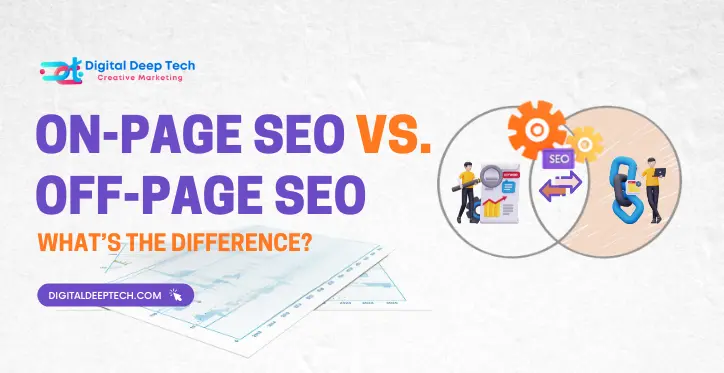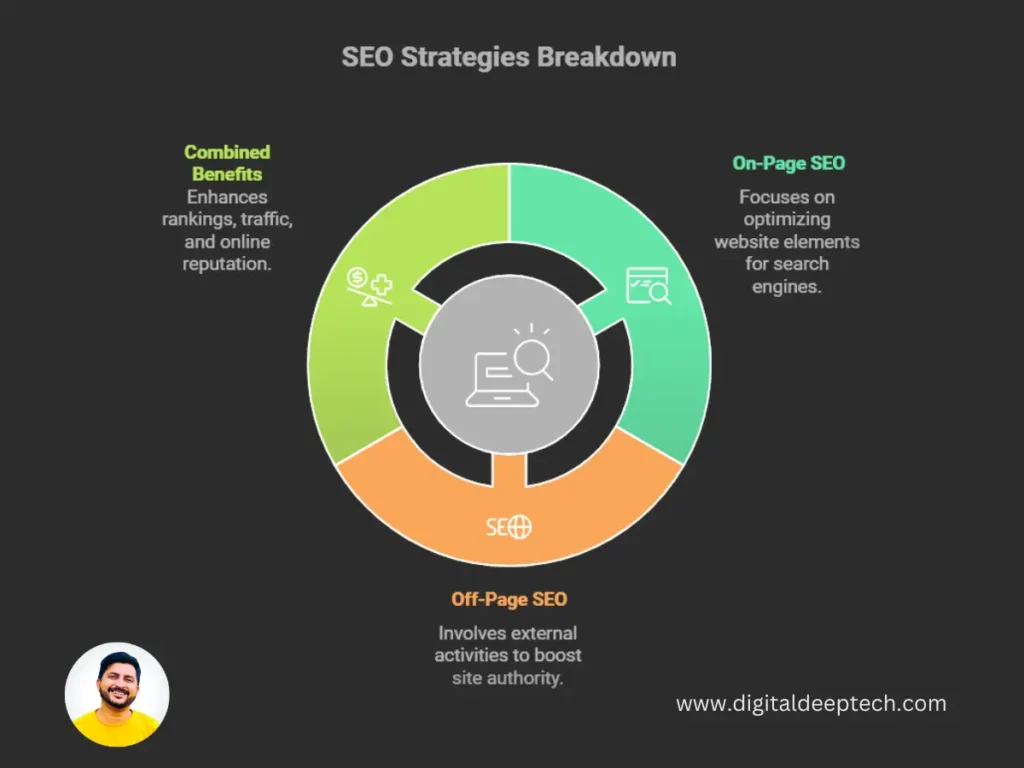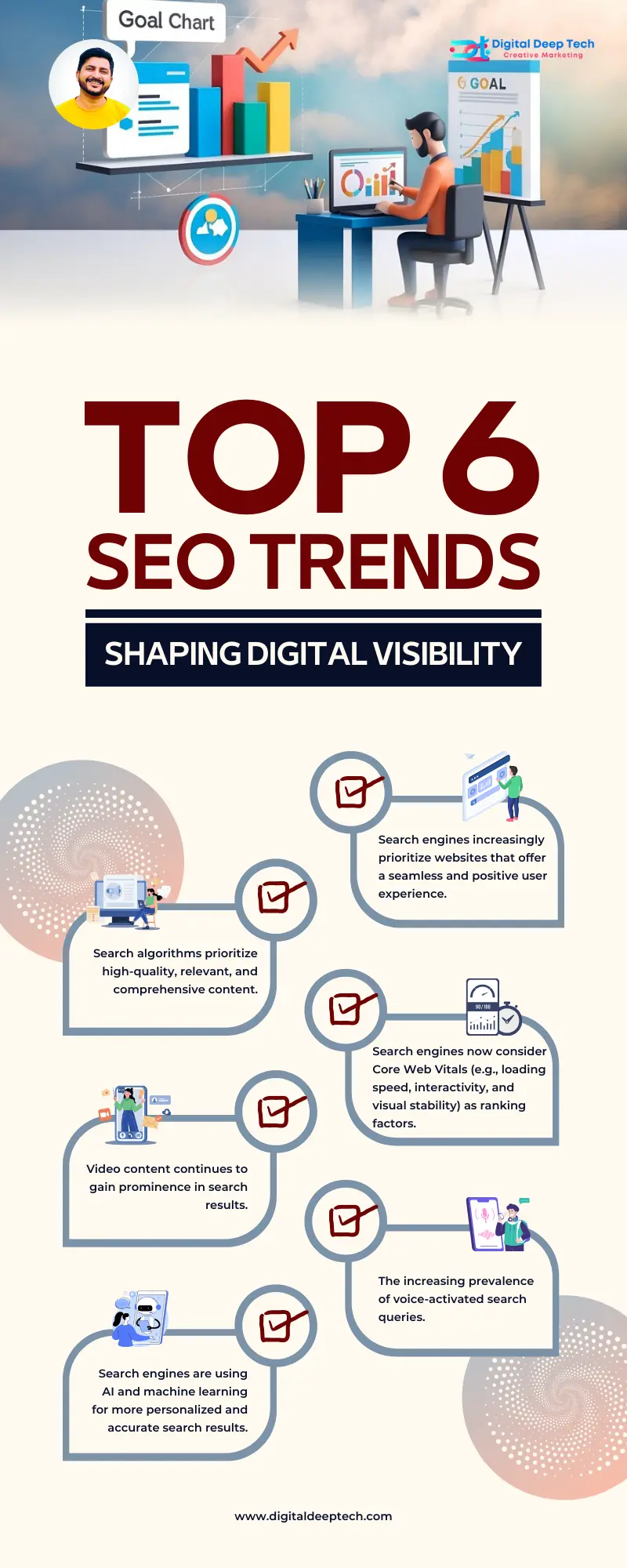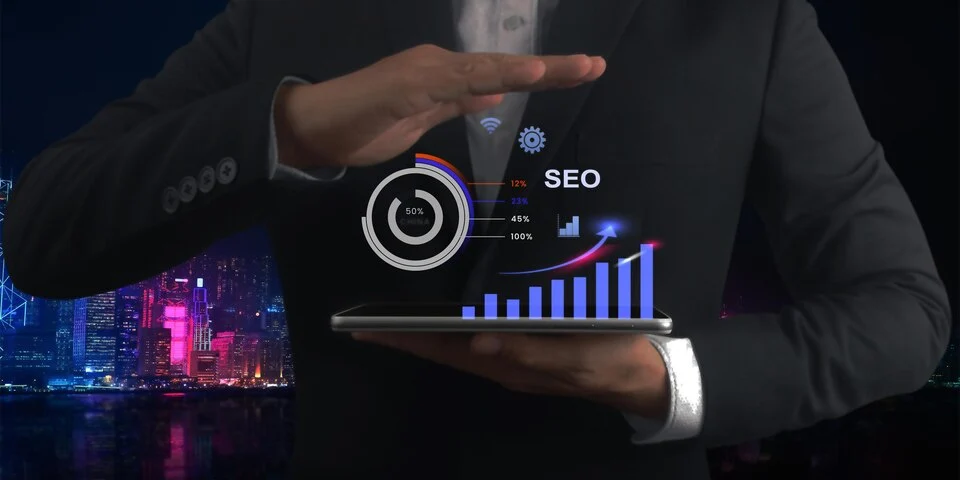On-Page SEO vs. Off-Page SEO: What’s the Difference?

Table of the content
Introduction
One question more than any other I get asked as a Local SEO expert and the founder of Digital Deep Tech is: What is the difference between On-Page SEO and Off-Page SEO? Most people consider SEO as one single thing, though it is indeed split into two major components: On-Page SEO and Off-Page SEO.
Although they both serve a different purpose, being able to use either one well does a lot to make sure that the success of your website bears fruit. I’d like to outline the differences between each of them, why they matter, and exactly how you can actually use them to get a kick-start on Google.
Your SEO Strategy Is Lacking
Or maybe you have optimized your website, and the traffic and rankings do not seem to come close to the mark. Or perhaps you’ve added quality content with some relevant keywords, but nothing seems impressive. Now, you sit there and wonder, Why am I not ranking higher?

You're Missing Half of the Puzzle
The truth is here that by focusing only on On-Page SEO or just Off-Page SEO you miss one of the most important parts of your strategy. Just like search engines will understand your content in case of On-Page SEO, the same process is where Off-Page SEO would establish credibility and authority. So, settling for one kind of SEO alone is trying to build a house without a proper foundation or just with cheap materials. Both must go hand in hand if you want to see meaningful results.

Learn to Master On-Page SEO and Off-Page SEO
And though understanding both On-page SEO and Off-page SEO determines the optimization of the website, the two, when properly done, will complement each other in attaining the best approach for an SEO strategy that improves rankings, organic traffic, and performance of the website.
On-Page SEO: The Blueprint of Your Website
It’s everything you do on your website itself to rank higher in search. On-Page SEO: It’s building a house. If the ground it is built on is shaky, the whole thing will crumple. Your On-Page SEO makes sure that search engines and users can understand, navigate, and find value in your content. The good news? On-Page SEO is entirely in your control.
Important Factors of On-Page SEO
Dive deeper in, and let’s look at the most basic components of On-Page SEO which you should pay attention to:
- Keyword Optimization: This is the foundation of SEO. You must apply natural keywords towards your content, title tags, and headers. Don’t overdo it. Google’s algorithm is smart enough to see through keyword stuffing. Use the Google Keyword Planner or SEMrush tool to pick the optimal keywords for your target audience.
- Tip: Find long tail keywords. These are more specific and less competitive. Target instead of “SEO,” target “cheap SEO services for small businesses.”
- Title Tags & Meta Descriptions: Title tags and meta descriptions are the first impression to both a search engine and to a user. A good title where you include your target keyword improves your CTR. A well-written meta description gives users a reason to click.
- Example: if the keyword for your content is “On-Page SEO vs. Off-Page SEO, then your title will be something like “On-Page SEO vs. Off-Page SEO: Key Differences for Better Rankings.”
- Content Quality: search engines favor quality content that could be relevant to the users. Write to solve the problem of users and not to fill words. The longer users are on your site, the better your rankings will be.
- Tip: Use headings, bulleted lists, and short sentences to make your content more scannable.
- Internal Linking: You assist a user in navigating the site as you link other pages in the site, and help engines crawl the site in an efficient manner. There is internal link building; this enhances page authority and user experience.
- Point to cornerstone content or high-performing pages
- Enhance general SEO performance throughout your whole site
- Mobile-Friendliness: More than half of the traffic in the world comes through mobile phones. Google now uses mobile-first indexing, so it is applying for mostly ranking and indexing the version of your site that is presented from a mobile device.
- Tip: Test your site on several devices to ensure it is mobile-friendly and faster.
- Page Speed: Users won’t wait for a slow website to load. A delay of even a few seconds means higher bounce rates and lesser rankings.
- Tools: Measure your site speed using Google PageSpeed Insights. Compress images, enable browser caching, and remove unnecessary code.
- URL Structure: URLs should be short in length; descriptive and containing your target keywords. Do not use long and complex URLs as both the user and search engine find them difficult to understand.
- Example : “www.yourwebsite.com/page/12345” instead of “www.yourwebsite.com/on-page-seo-tips”.
- Schema Markup: Schema markup is extra code inserted into a website to make its content more understandable for search engines. That might make your website perform better in SERPs, especially in terms of rich snippets like star ratings, prices, or reviews.
- TIP: Add structured data markup on product pages, FAQs, and reviews.
I audit the website with a client. Therefore, I optimize their content using suitable keywords, fill meta descriptions with a motive to persuade viewers, and ensure that the page speed meets the guidelines set by Google. Appropriate internal linking keeps users engaged while ensuring the structure of URLs is remade to be more search-friendly.
Off-page SEO: Building Authority Beyond Your Website
But essentially, it continues working on making your site authoritative and renowned not only in your domain but further. It will be what Google – and users – learn to trust about your site. Just a bit like building relations with other good sites and communities who can speak for you; Off-Page SEO will pick up where On-Page SEO leaves off for your website.
Let's Discuss Your Project
Get a free one-week consultation and share your vision for digital marketing with us.
Key Elements an Off-Page SEO Strategy
- Backlinks: A backlink is a link that other sites make to your site. They are tantamount to “votes of confidence,” indicating to the search engines that the information you are providing is trustworthy and worthwhile. Of course, not all backlinks are equal, and spammy links from low-quality sites are worth next to nothing.
- Tip: Acquire backlinks through good quality content, guest posts and influencer relations within your niche.
- Social Media Engagement: Social Signals including likes, shares and retweets are not ranking elements per se for SEO, however social traffic boosts to your site could positively impact SEO. Good social media presence both builds brand awareness and credibility.
- Practical Tip: Post your blog entries on social media platforms such as LinkedIn, Twitter, or Facebook. Ask your followers to share and comment on your work with others.
- Brand Mentions: Although the website itself does not link back to your site, this will help with Off-Page SEO. Your business will benefit by increasing brand awareness because people are talking about your company, and the search engines are aware too.
- Suggestion: This technique also allows you to monitor all occurrences where your brand name is used through Google Alerts and have an option to jump in whenever you like.
- Guest Blogging: Guest posts on excellent blogs will not only bring you more backlinks but will also position you as being more authoritative of your subject matter. Guest posts expose new audiences to your content and legitimize your expertise.
- For example, you are targeting to narrow down SEO, then guest post to marketing blog or website particularly on a digital marketing.
- Influencer Outreach: this will greatly increase online presence because when influencers mention or share your content, it spreads and increases the exposure of your brand, making it seem well known, and authentic.
- Wrap your head around this: it is advisable to reach out to the influencers in your niche and offer them valuable content they can share with their audience.
- Online Reviews and Local Citations: Getting enlisted in local directories and amassing high positive reviews is very important to local businesses. Google My Business, Yelp, and TripAdvisor enable users to review your business. Such reviews tend to build trust and enhance local SEO.
- Recommendation: Get your happy customers to post reviews and get business details correct on all directories.

My Practical Strategy: How I Build Authority
Off-page SEOs for clients I will focus on the quality rather than the quantity I will befriend both industry experts and blog posts in high-authority sites. Monitor mentions of brands about my clients Check the updation of social media profiles of my clients for their relevance in the online community.
On-page vs. Off-page SEO

Until now, you have come to develop a good feel of On-Page SEO and Off-Page SEO. Now, let’s dedicate just a few minutes trying to recap these basic differences:
- On-Page SEO: Optimization of all the pieces on your own website over which you have control. For example, such content, keywords, meta tags, and site speed, among others.
- Off-page SEO: Things beyond your website, like backlinking, social media, and brand mentions-all creating authority for your website.
Why Both Matter
If you only focus on On-Page SEO, then you lose out on the credibility and authority that Off-Page SEO provides. And if you ignore On-Page SEO, all your great backlinks won’t save you because search engines
can’t comprehend or believe what you have there.
Ultimately, you are going to need both for high rankings on search engines.
Conclusion
The balance achieved between On-Page SEO and Off-Page SEO is the core for actual SEO success. In other words, it is neither On-Page SEO nor Off-Page SEO alone but how both work in concert to give your website the best possible opportunity to rank high on search engines.
Actually, I find that with just two major pillars of SEO, a huge number of businesses change their online presence. So, when you are starting with these tactics, do remember, for SEO it’s play and patience. Nothing changes overnight, but if you are persisting and carry a perfect plan that amalgamates the effective usage of both On-Page SEO as well as Off-Page SEO then over time, you can see it.
Feeling tired and out of breath? Let’s catch up sometime, then, and we can explore working on a specific SEO strategy for your business.
Frequently Asked Questions (FAQs)
1. What's the basic difference between On-Page SEO and Off-Page SEO?
The efforts you make to optimize elements on your website, like content, keywords, title tags, and website speed. And on the other side are actions on other websites that can influence your website authority and rankings through backlinking, social media engagement, brand mentions, etc.
2. Why is On-Page SEO important?
On-page SEO means your website will be understood by the search engine, thereby improving your ranking. Directly optimizing on-page variables such as keyword placement, page speed, mobile-friendliness, and internal linking are factors that will directly impact your visibility on the search engine as well as the user experience.
3. Why is Off-Page SEO important for ranking?
Off-page SEO helps search engines determine whether or not your website could be trusted and authoritative. Backlinks from credible sites, social signals, and brand mentions tell the search engines that the content is worthy enough to rank.
4. What are Backlinks and How Do They Contribute to Off-Page SEO?
A backlink is basically a “vote of confidence” from another site. When trusted sites link to your content, it sends the signals that your site is trustworthy and authoritative; therefore, making search results rank you better.
5. What are some On-Page SEO Best Practices?
The basic practices are optimization of the title tags and meta descriptions, keywords relevance, page speed, clean structure of URLs, internal linking, and ensuring that a website is mobile-friendly.
6. Can I rank well with only On-Page SEO?
While on-page SEO is very important, on its own this would not be enough to position your site at the top of the super competitive niches. You will need some kind of off-page SEO tactic like quality backlinks and building authority to make more than cosmetic improvements with SEO.
7. How might I improve my Off-Page SEO on my website?
Strategize over acquiring quality back links from authentic sites, promote social media for increase in online presence, form an influencer relationship in your industry, and acquire positive online reviews.
8. Does social media share affect SEO rankings?
While social media shares do not have a direct impact on ranking, they can build more traffic, increase brand visibility, and provide scopes of acquiring backlinks thus indirectly helping efforts with SEO.
9. How can I measure the success of my On-Page SEO?
You monitor your performance in On-Page SEO through the use of Google Analytics and Google Search Console, which track your website’s traffic, bounce rate, rankings, and how users behave with your content.
10. What are some of the simple Off-Page SEO mistakes that a person should avoid?
Others to avoid are just really poor link building practices, like buying links or trying to get links from sites or blogs that have nothing to do with your niche or have some spam or something.
And don’t forget about social media marketing and forgetting to use any sort of local SEO strategy, like ensuring your business is listed on Google My Business.

About the Author
Deepak Sharma is the founder of Digital Deep Tech and a renowned SEO and digital marketing expert with over a decade of experience. Passionate about helping businesses enhance their online presence, Deepak specializes in creating SEO strategies that drive traffic and generate leads.




